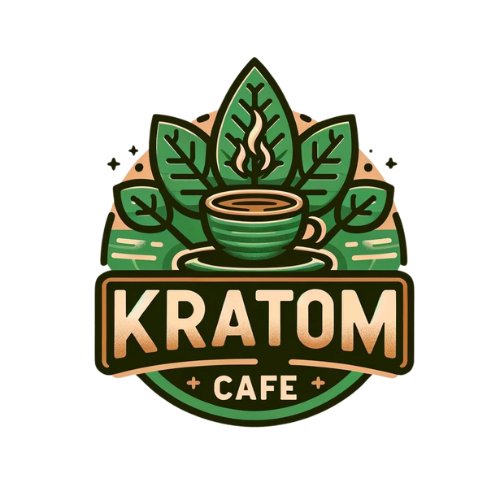Herbal mood boosters are gaining popularity for their natural approach to enhancing well-being.
We at Kratom Cafe believe in the power of nature’s remedies.
Learn about some popular options, how to use them effectively, and the necessary precautions to take.
Your journey to improved mood could benefit from these insights on herbal supplements.
What Are the Top Herbal Mood Boosters?
St. John’s Wort, Ashwagandha, and Rhodiola Rosea are some of the most promising herbal mood boosters available today. Each herb offers unique benefits, backed by real-world use and scientific inquiry. Here’s how you can integrate them into your well-being regimen.
St. John’s Wort Benefits
St. John’s Wort has been used for centuries to enhance mood and manage symptoms of depression. It works by increasing the levels of serotonin in the brain. Numerous studies have shown its effectiveness for mild to moderate depression. However, it’s essential to use it with caution, as it can interact with various medications, such as antidepressants, birth control pills, and certain heart medications.
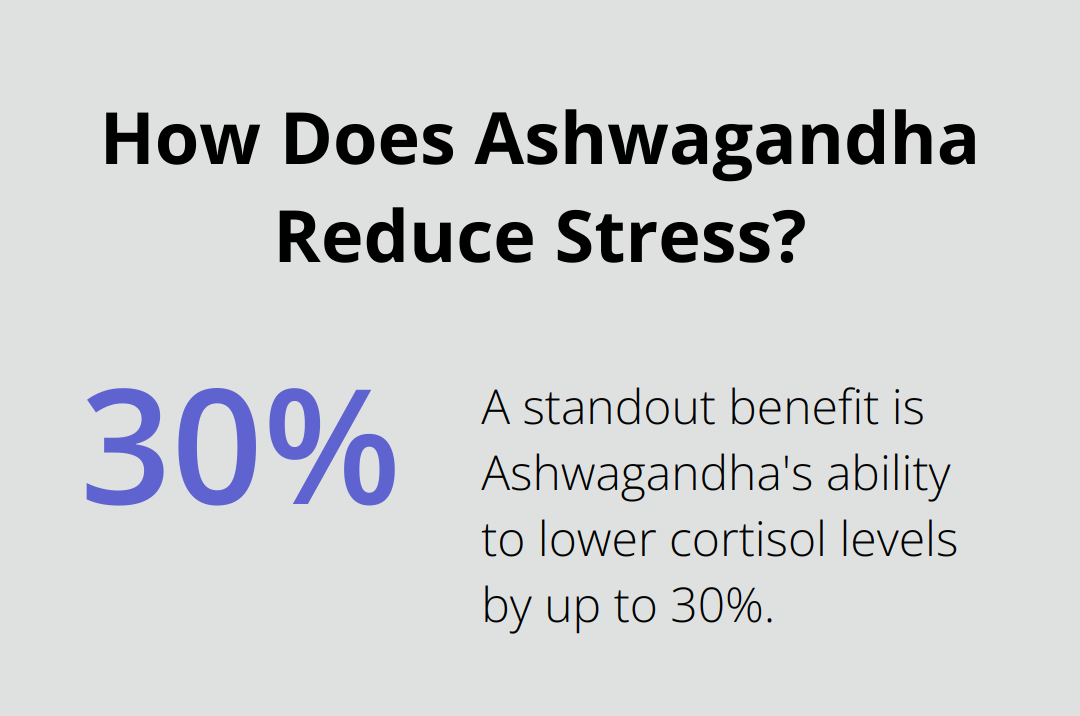
For best results, a dosage of 300mg to 600mg taken two to three times daily is recommended. Be mindful of consistent usage for at least four weeks to gauge effectiveness. Avoid combining with other mood-enhancing herbs or medications without professional guidance.
Ashwagandha for Stress Relief
Ashwagandha, traditionally used in Ayurveda, is known for its adaptogenic properties that help the body manage stress. A standout benefit is its ability to lower cortisol levels by up to 30%. High cortisol levels can cause anxiety and mood swings, making Ashwagandha an effective option for stress management.
For practical use, consider capsules or powder form. A dosage of 300mg to 500mg daily has shown to improve mood and reduce stress. Some prefer to mix the powder with smoothies or teas for ease of use. Bear in mind that consistent intake over several weeks yields the best results.
Rhodiola Rosea for Fatigue and Mood
Rhodiola Rosea is another adaptogen that helps combat fatigue and improve mood. Studies have noted that taking Rhodiola can reduce symptoms of burnout and enhance mental performance. It directly influences neurotransmitters like dopamine and serotonin, which are pivotal in regulating mood.
A common dosage is 200mg to 600mg per day, often divided into two doses. The herb is usually taken in capsule form, making it convenient for daily routines. It’s advisable to take Rhodiola Rosea before meals for better absorption.
For those interested in broader mood enhancement options, this post about mood-enhancing kratom may provide further insights.
Use these herbs responsibly, monitoring their effects and adjusting as necessary. Always consult with a healthcare provider if you’re on medication or have underlying health conditions. Your journey to better mood can be natural and effective with the right approach.
How to Use Herbal Mood Boosters
Integrating herbal mood boosters into your routine can be straightforward and rewarding. Key factors include the right dosages, appropriate times for consumption, and the potential benefits of combining these herbs with other therapies.
Recommended Dosages
Starting with the correct dosage is vital. For St. John’s Wort, 300mg to 600mg taken two to three times daily is advisable. Consistency is key, so maintain this regimen for at least four weeks. For Ashwagandha, a daily intake of 300mg to 500mg is sufficient. This can be in capsule form or as powder mixed with food or drinks. Rhodiola Rosea usually requires 200mg to 600mg per day, split into two doses for optimal absorption.
Ideal Times of Day for Consumption
Timing can enhance the efficacy of these herbs. St. John’s Wort is best taken in the morning and early afternoon to align with its potential energizing effects. Ashwagandha works well in the evening due to its calming properties. Rhodiola Rosea should be consumed before meals, preferably in the morning and around lunchtime, to boost energy and mood throughout the day.
Combining with Other Therapies
Herbal mood boosters often yield better results when combined with other therapies. Exercise is a proven mood enhancer as well. Engaging in moderate activity for three hours a week can complement the effects of herbal supplements. Mindfulness techniques, such as meditation or yoga, can synergize with Ashwagandha’s stress-relieving properties.
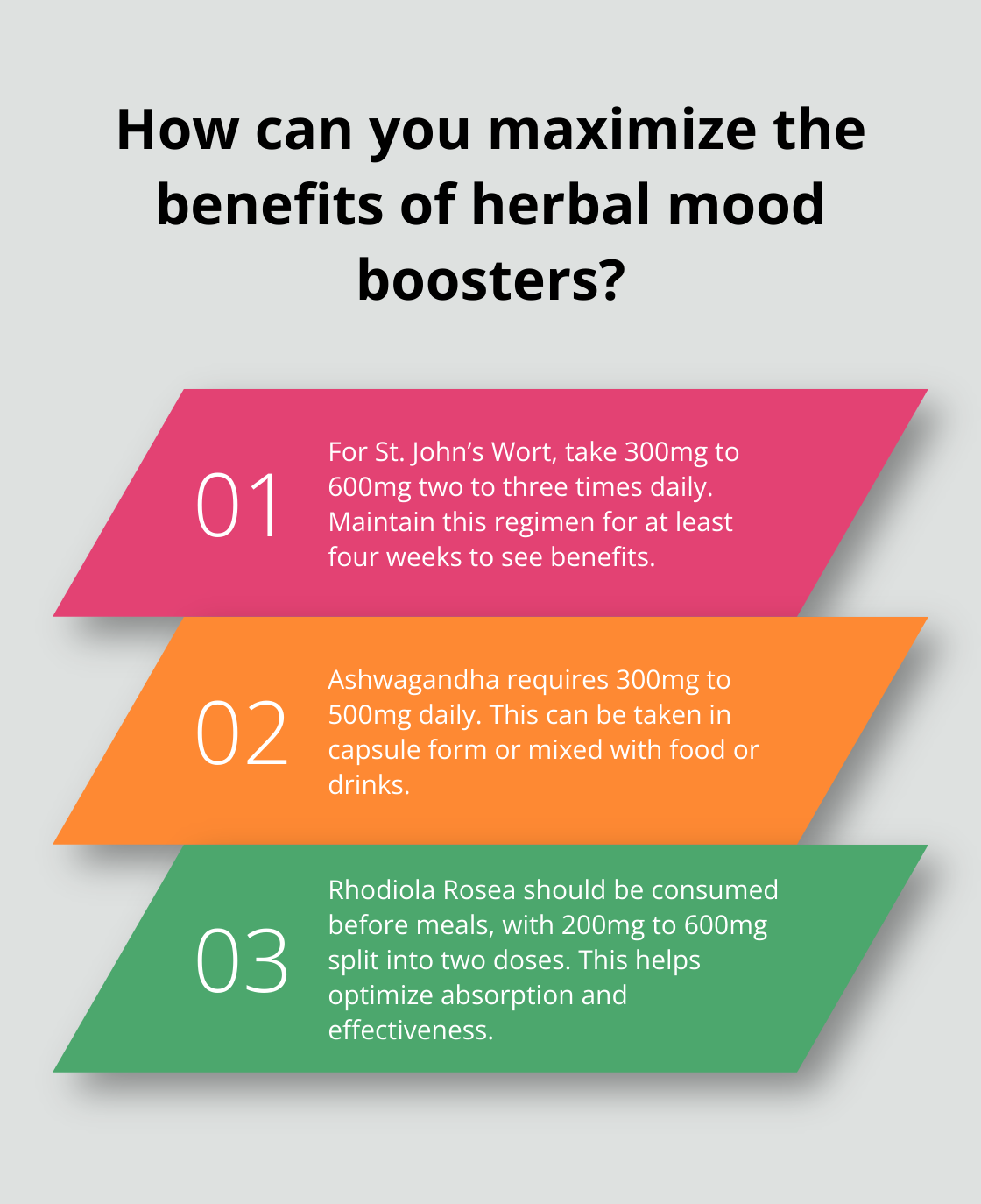
For comprehensive mood management, consider adding other herbal supplements. For instance, incorporating a vitamin D rich diet, known for its mood-boosting effects, could be beneficial.
Combining therapies should be done thoughtfully. Always consult healthcare providers to avoid interactions, especially if you’re on medication. By following these actionable steps, you can make the most out of herbal mood boosters to improve your well-being naturally.
For further insights on enhancing mood through natural remedies, check out this guide to natural mood boosters.
Precautions and Side Effects
Herbal mood boosters offer a natural route to better well-being, but it’s important to be mindful of their potential interactions and side effects. This approach requires careful consideration, especially if you are already on medication or have pre-existing health conditions.
Medication Interactions
One of the most significant concerns is how these herbs can interact with medications. St. John’s Wort, for example, can interfere with birth control pills, antidepressants, and heart medications, sometimes making them less effective. If you are on medication, consult a healthcare provider before starting any herbal supplement. They can help you navigate potential interactions to avoid any adverse effects.
Recognizing Overdose Symptoms
While overdosing on herbal supplements is less common than with synthetic medications, it’s still possible. Signs of overdose can include dizziness, digestive issues, and increased anxiety. For Ashwagandha, excessive amounts can lead to digestive upset and even thyroid issues in rare cases. If you experience any adverse effects, discontinue the herb immediately and seek medical advice.
Consult Healthcare Professionals
Always consult with a healthcare professional before adding herbal mood boosters to your regimen. This is essential for ensuring safety, particularly if you are also taking other medications. Healthcare providers can offer tailored advice based on your unique health profile and guide you on the appropriate dosages and potential interactions.
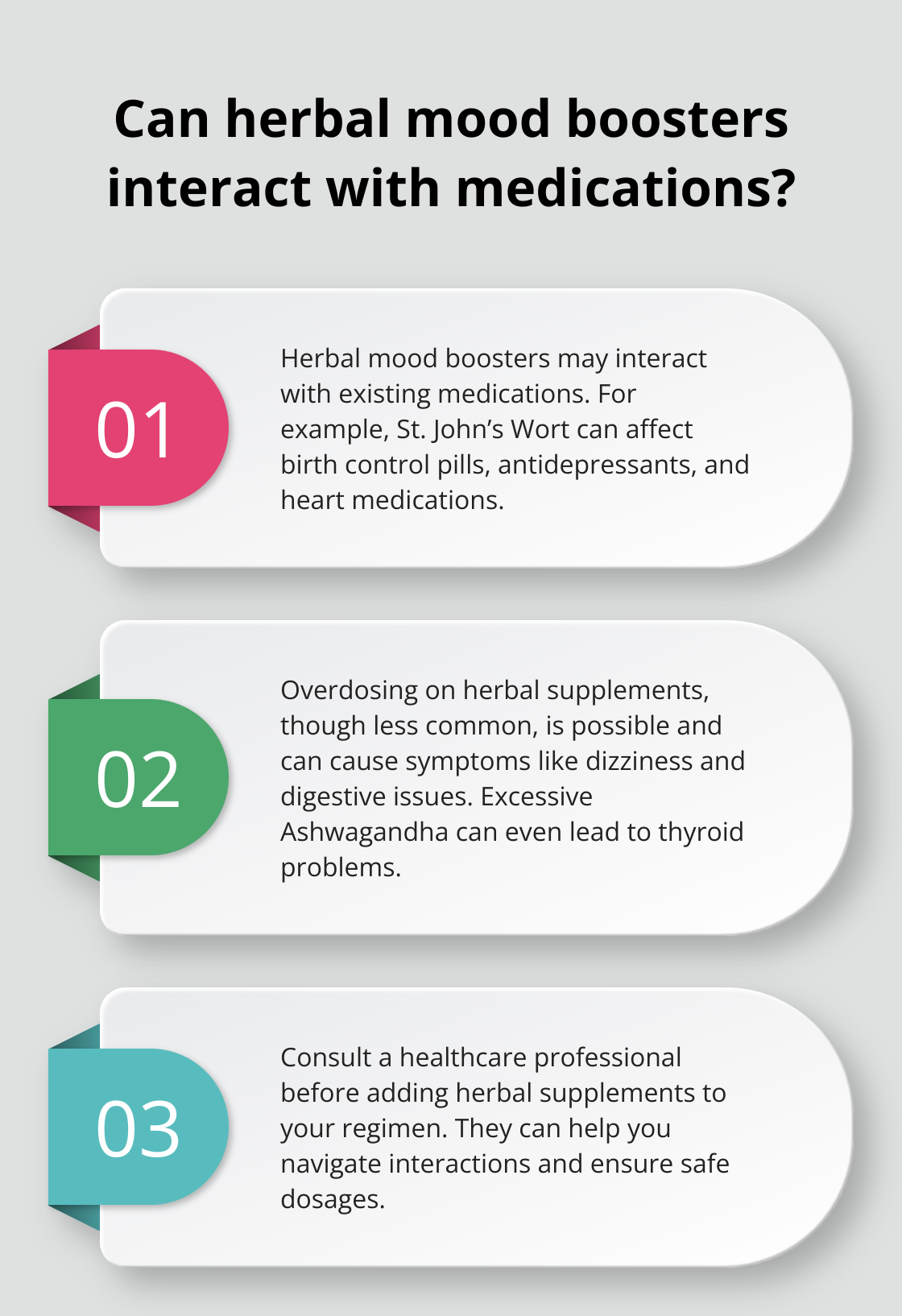
For further guidance on safe consumption of herbal remedies, explore this comprehensive safe kratom use guide.
Conclusion
Herbal mood boosters such as St. John’s Wort, Ashwagandha, and Rhodiola Rosea offer numerous benefits. They can help lift mood, manage stress, and fight fatigue. Utilizing these herbs with the recommended dosages and timings can enhance their effectiveness. For example, taking Ashwagandha during the evening aligns with its calming properties, while Rhodiola Rosea can boost energy when consumed before meals.
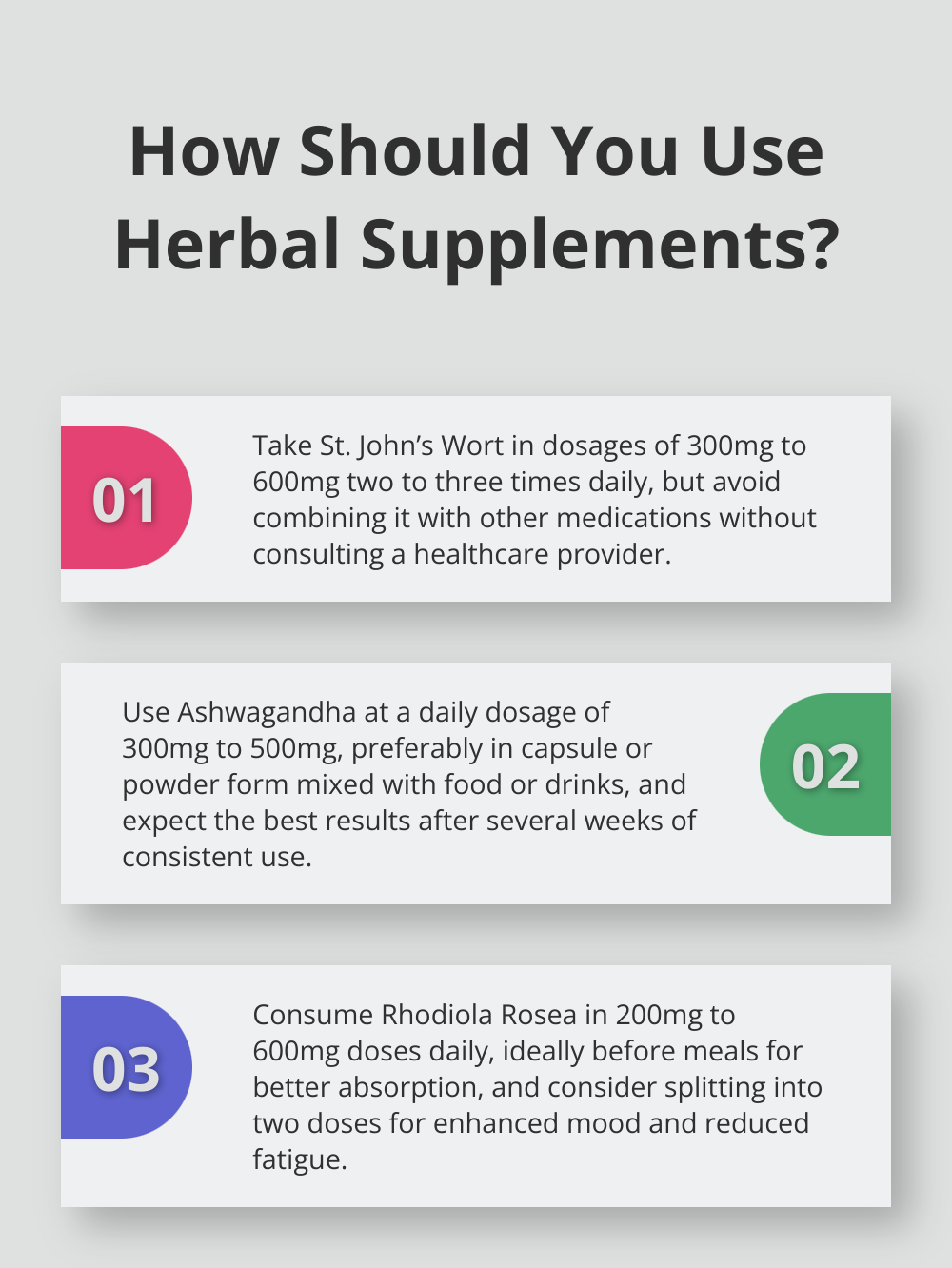
Personalization in herbal supplement use is crucial. Identifying the right herb and dosage that fits your lifestyle and specific needs makes all the difference. Not everyone will respond the same way to herbal mood boosters, so monitoring how your body reacts is essential. Adjustments may be necessary to find what works best for you.
Lastly, professional advice is invaluable when considering herbal supplements. Consulting with healthcare providers ensures safety, particularly for those on medication or with pre-existing conditions. This guidance can help avoid potential interactions and side effects, making your journey to a better mood both effective and safe.
For comprehensive information on various herbal remedies, visit Kratom Cafe. We provide a digital hub where you can explore detailed insights into Kratom and other natural solutions for well-being.
